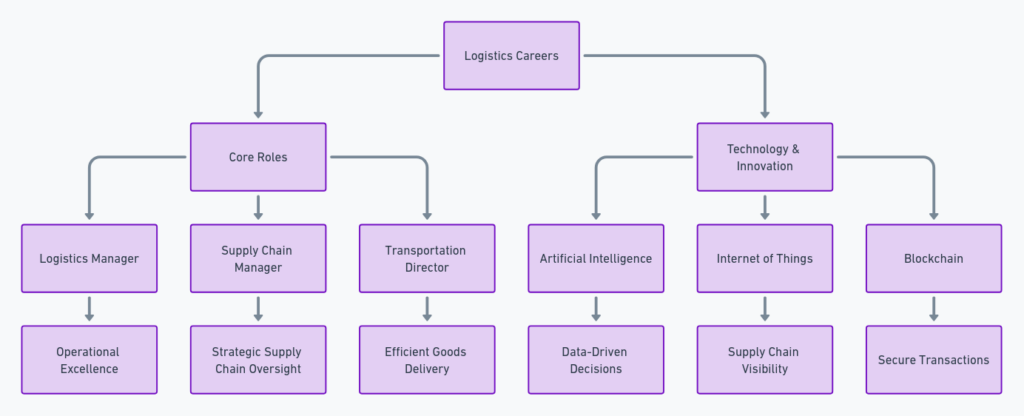The logistics industry is a cornerstone of global trade and commerce, seamlessly connecting markets across continents and enabling the flow of goods worldwide. Its significance cannot be overstated, as logistics not only ensures the delivery of goods to consumers but also plays a crucial role in the economy, impacting everything from local businesses to international trade agreements. The evolution of logistics roles, propelled by technological advancements and globalization, has transformed the industry into a dynamic and complex field. Today’s logistics professionals need to navigate a landscape that’s being reshaped by innovations such as artificial intelligence, the Internet of Things, and blockchain technology, alongside an ever-expanding global market.
Exploring High-Earning Roles in Logistics
Logistics Manager
At the helm of logistics operations, Logistics Managers ensure the smooth execution of transportation, warehousing, and supply chain management. Their role is central to optimizing logistics processes, reducing costs, and enhancing customer satisfaction. With the responsibility of overseeing the entire logistics operation, they are pivotal in strategic decision-making and the implementation of efficient logistics solutions. The complexity and scale of modern supply chains demand Logistics Managers who are not only adept at operational tactics but also capable of leading teams through challenges and innovations.
Supply Chain Manager
The role of a Supply Chain Manager is to oversee and refine the supply chain process, from the initial procurement of materials to the final delivery of products. This involves a strategic overview of the supply chain to identify areas for improvement, cost reduction, and efficiency enhancement. Supply Chain Managers work closely with suppliers, manufacturers, and customers to ensure a seamless flow of goods. Their expertise in strategy development is crucial for navigating the complexities of global supply chains, making them highly valued in organizations striving for competitive advantage and sustainability.
Transportation Director
Overseeing a company’s transportation strategy, Transportation Directors are responsible for the efficient and cost-effective delivery of goods. They ensure compliance with transportation laws and regulations, manage fleet operations, and develop strategic plans to meet organizational goals. Their work involves a detailed understanding of logistics networks and the ability to adapt to changes in the market or regulatory environment. Transportation Directors play a key role in optimizing transportation routes, negotiating with carriers, and implementing technologies to track and manage shipments effectively.
The Role of Technology in Logistics Careers
The logistics industry is undergoing a significant transformation, driven by the integration of cutting-edge technologies. Artificial Intelligence (AI), the Internet of Things (IoT), and blockchain are at the forefront of this revolution, transforming traditional logistics roles into data-driven and highly efficient positions.
AI and Machine Learning are optimizing routes, predicting market demand, and managing inventory with unprecedented precision, reducing waste, and significantly lowering costs. Logistics professionals skilled in these technologies are highly sought after for their ability to leverage data for strategic decision-making.
IoT technology is enhancing visibility across the supply chain. Sensors and trackers provide real-time data on the location, condition, and progress of goods, from warehouse to final delivery. This increased transparency is vital for logistics operations, allowing for more accurate tracking and better risk management.
Blockchain introduces a level of security and trust previously unattainable in logistics. By enabling tamper-proof and transparent record-keeping, blockchain technology ensures the integrity of supply chain data and facilitates smoother transactions and compliance processes.
As logistics operations become more reliant on technology, roles such as IT architects in logistics are becoming increasingly lucrative. These professionals focus on designing robust network infrastructures and implementing cybersecurity measures to protect sensitive data and systems. Their work is critical in ensuring that logistics operations can function efficiently and securely in the digital age.
The Rise of Third-Party Logistics (3PL) and Beyond
The trend of outsourcing logistics operations to Third-Party Logistics (3PL) providers continues to grow, driven by the complexity of modern supply chains and the need for efficiency and scalability. 3PL providers offer a range of services, from transportation and warehousing to inventory management and fulfillment services, allowing businesses to focus on their core competencies while leveraging the logistics expertise of their partners.
The evolution of logistics models doesn’t stop at 3PL; the emergence of Fourth-Party Logistics (4PL) and Fifth-Party Logistics (5PL) models represents the next step in the sector’s evolution. 4PL providers act as integrators, managing the entire supply chain and offering more strategic oversight and optimization capabilities. 5PL models take this further by leveraging technology to aggregate demand across multiple supply chains, optimizing logistics operations on a global scale.
Emerging Trends Influencing Logistics Careers
The logistics sector is currently witnessing several key trends that are shaping the future of logistics careers. The adoption of cloud computing is one such trend, offering scalable solutions for data storage and management, thus enabling more efficient logistics operations. Cloud-based platforms facilitate better collaboration between different stakeholders in the supply chain, enhancing the ability to make data-driven decisions.
Another significant trend is the increasing importance of supply chain visibility. In today’s fast-paced market, consumers demand to know the whereabouts of their orders in real-time. This need for transparency is driving logistics companies to invest in technologies that provide end-to-end visibility of the supply chain, from procurement to delivery.
Additionally, there’s a strong move towards sustainable and agile logistics operations. Sustainability in logistics involves optimizing routes to reduce fuel consumption, using eco-friendly packaging materials, and minimizing waste. At the same time, agility in logistics operations ensures that companies can quickly adapt to changes in the market or disruptions in the supply chain, maintaining efficient operations under various circumstances.
These trends are creating a demand for logistics professionals who possess a blend of technical know-how, strategic thinking, and a commitment to sustainability. Understanding these trends and their implications on logistics operations is crucial for anyone looking to build a successful career in this field.
Building a Career in Logistics: Skills and Qualifications
For those aiming for high-earning roles in logistics, certain skills and qualifications are indispensable. Technical skills, especially proficiency in logistics software and an understanding of the technologies shaping the industry (such as AI, IoT, and blockchain), are critical. Additionally, a deep knowledge of supply chain management principles and practices is necessary to navigate the complexities of modern logistics operations effectively.
Leadership abilities are also paramount, as many logistics roles involve managing teams, making strategic decisions, and driving change within organizations. Strong communication skills, the ability to solve complex problems, and adaptability are other key competencies required in this dynamic field.
As for educational pathways, degrees in supply chain management, logistics, business administration, or a related field can provide a solid foundation. Pursuing certifications such as the Certified Supply Chain Professional (CSCP) or Certified in Logistics, Transportation and Distribution (CLTD) can also enhance one’s prospects in the job market. Gaining experience through internships or entry-level positions in logistics or supply chain management is invaluable for applying theoretical knowledge in real-world settings.
Charting a Course Through Logistics Careers

As the logistics sector continues to expand and evolve, driven by globalization and technological innovation, it presents a wealth of opportunities for those looking to forge a rewarding career path. This simplified diagram, “Logistics Career Essentials,” distills the essence of thriving in the logistics industry, focusing on core roles and the transformative impact of technology.
Core Roles like Logistics Manager, Supply Chain Manager, and Transportation Director are crucial to the industry’s operation, each requiring a blend of operational expertise, strategic planning, and leadership. These positions are central to ensuring the efficient, cost-effective movement of goods and the resilience of supply chains.
Technology and Innovation play a pivotal role in modern logistics, with advancements in Artificial Intelligence, the Internet of Things, and Blockchain revolutionizing how logistics professionals manage data, gain visibility into the supply chain, and secure transactions. Mastery of these technologies is becoming increasingly vital for logistics professionals aiming to stay ahead in a competitive and rapidly changing environment.
For those navigating the logistics field, understanding the interplay between these core roles and technological advancements is key to unlocking high-earning opportunities and contributing to the industry’s future. As logistics continues to be a critical component of global commerce, professionals equipped with the right skills and knowledge will find themselves well-positioned to lead and innovate.
Conclusion: Navigating Your Path to Success in Logistics
Building a successful career in logistics requires a strategic blend of technical proficiency, deep understanding of supply chain management, and strong leadership skills. As the industry continues to evolve under the influence of technological advancements and shifting market demands, staying informed about emerging trends and continuously developing your skill set becomes crucial. Embrace the opportunities presented by trends such as cloud computing, supply chain visibility, and sustainability to differentiate yourself in the job market. With the right qualifications, a commitment to ongoing learning, and the ability to adapt to change, you can navigate your path to success in the dynamic and rewarding field of logistics, aiming for the sky in your career aspirations.

